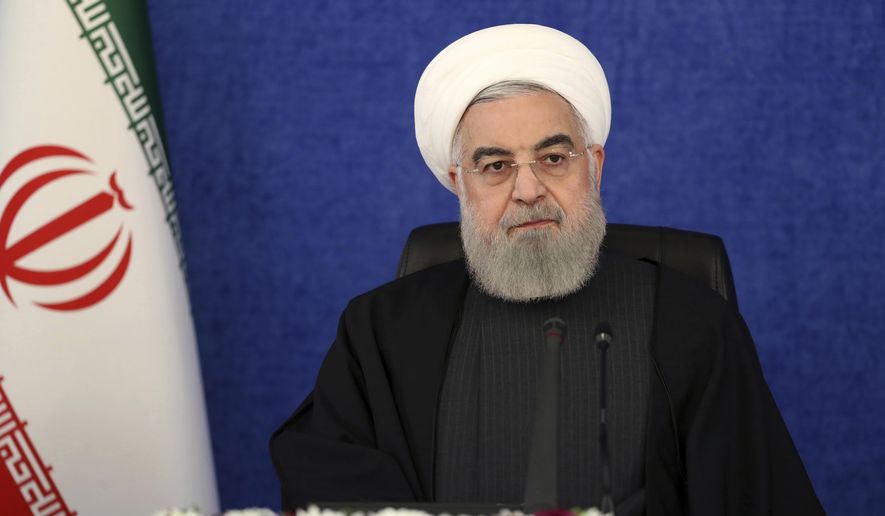A bipartisan group of 140 members of Congress says it supports the Biden administration’s desire to engage with Iran, but only if the goal is to reach a deal that goes beyond simply limiting Iranian nuclear activities and addresses Tehran’s ballistic missile programs and support for terrorism.
“We are united in preventing an Iranian nuclear weapon and addressing the wide range of illicit Iranian behavior,” the group of 70 Democrats and 70 Republicans wrote in a letter to the administration on Tuesday, asserting that “Iran’s malign behavior throughout the Middle East must be addressed.”
The letter, spearheaded Rep. Anthony Brown, Maryland Democrat, and Rep. Michael Waltz, Florida Republican, comes as the Biden administration seeks to rejuvenate the 2015 Iranian nuclear deal that former President Trump pulled the U.S. out of in 2018.
The Trump administration was sharply critical of the Obama-era deal, which had eased international sanctions on Iran in exchange for limits to and inspections of Iranian nuclear activities, but had ignored Tehran’s regional meddling, support for terrorism and ballistic missile program that violated years of U.N. Security Council resolutions.
After pulling out of the deal, the Trump administration ramped up military pressure and U.S. sanctions against Iran. Mr. Trump said his goal was to pressure Tehran into a new negotiation that would address the other matters left out of the Obama-era nuclear deal.
Tuesday’s letter from members of Congress suggests a growing number of lawmakers on both sides of the aisle now hope Mr. Biden will proceed with the approach laid out by Mr. Trump. While the letter did not mention the former president, it warned against ignoring Iran’s meddlesome activities around the Middle East.
The government in Tehran “has sowed chaos in Syria and Yemen, continued to arm Hezbollah and worked to provide the terrorist group with precision-guided missiles to attack Israel, and backed forces in Iraq that have targeted American troops and worked to undermine the Iraqi government,” the lawmakers wrote.
“America and our allies must engage Iran through a combination of diplomatic and sanction mechanisms to achieve full compliance of international obligations and a demonstrated commitment by Iran to addressing its malign behavior,” they wrote. “Three core tenets — their nuclear program, their ballistic missile program, and their funding of terrorism — must be addressed from the outset.”
It remains to be seen what the Biden administration’s Iran policy will ultimately entail. Recent months have seen Iran ramp up its nuclear enrichment activities to levels that violate the 2015 nuclear deal that Tehran signed with the U.S., China, Russia and the European Union.
Secretary of State Antony Blinken has stressed that Iran must make the first diplomatic move by returning to the uranium enrichment limits laid out by the deal known in diplo-speak as the Joint Comprehensive Plan of Action (JCPOA). Iranian leaders say they have purposely breached those limits in response to the revival of U.S. economic sanctions during the Trump years.
Mr. Blinken has also signaled that the Biden administration would push for any future negotiation with Iran to address issues beyond Tehran’s nuclear activities, including its support of terrorism.
When asked about the letter sent to the administration by members of Congress on Tuesday, State Department spokesperson Ned Price said the “ideas put forward” in it are “consistent with the approach that we have [already] laid out.”
“If Iran resumes its full compliance with the JCPOA, resumes its commitments with the JCPOA, the United States would do the same,” Mr. Price told reporters, suggesting the Biden administration may be poised to ease sanctions on Tehran in exchange for reimposed curbs to the Iranian nuclear activities.
At the same time, he said the administration’s goal is to “lengthen and strengthen” the Obama-era deal by using it as “a platform to negotiate follow on agreements — agreements that would cover other areas of concern.”
“Two of those concerns, certainly are ballistic missiles and Iran’s support for terrorism,” Mr. Price said, adding that “these are still early days.”
But there is speculation among some lawmakers that the administration is poised to ease sanctions on Tehran without clearly communicating the move to Congress.
Rep. Michael McCaul, the ranking member of the House Foreign Affairs Committee and a Texas Republican whose name was notably absent from the letter sent to the administration on Tuesday, has introduced legislation that would enable Congress to review, and if necessary block, any effort by the administration to terminate U.S. sanctions against the Iranian regime.
Mr. McCaul introduced the legislation Tuesday as the House companion to a Senate side bill of the same nature that Sen. Bill Hagerty, Tennessee Republican, introduced in February.
• Guy Taylor can be reached at gtaylor@washingtontimes.com.




Please read our comment policy before commenting.